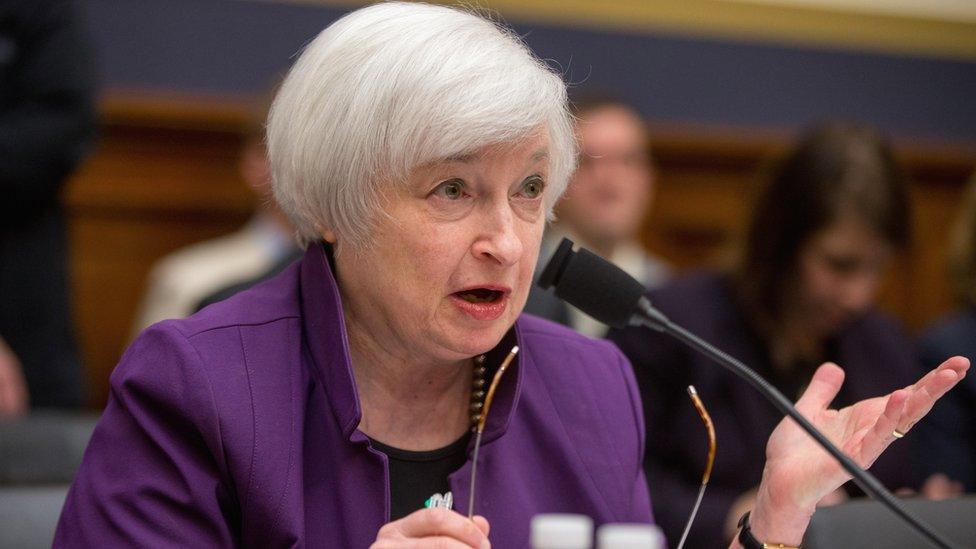US jobs data raises prospects of rate rise
- Published

Expectations of a rise in US interest rates in December have soared following a stronger-than-expected jobs report.
The US economy added 271,000 jobs in October, far exceeding the 185,000 jobs that economists had forecast.
That strong number has raised expectations that the US Federal Reserve will raise interest rates at its policy meeting in December.
The Fed cut rates to near-zero in December 2008 in response to the gathering financial crisis.
'Astounding number'
The recovery since then has been slow, but October's jobs report could help persuade policymakers that the time has come for the first rise in interest rates since June 2006.
"That was an astounding number. It's pretty clear that the Fed would be justified in hiking in December, if the economy doesn't hit another air pocket," said Brian Jacobsen, chief portfolio strategist at Wells Fargo Funds.
The report, from the Bureau of Labor Statistics, showed the jobless rate fell to 5% - the lowest rate in seven-and-a-half years.
In addition, there was positive news on previous months, with the number of jobs created in August and September raised by a net 12,000.
There was also a strong rise in wages last month. Average hourly earnings rose nine cents to $25.20, which is a 2.5% rise on a year earlier.
'Live possibility'
The strength of the labour market is an important consideration for the Fed when deciding whether to move interest rates.
Earlier this week, Janet Yellen, chair of the US Federal Reserve, told a Congressional committee that a rise in US interest rates in December was "a live possibility".

US Fed chief Janet Yellen holds the next interest rate meeting on 15 and 16 December
Multiple moves?
Some economists now think that a rise in December might be the start of a series of rate rises.
"It's almost a sure thing that the Fed will tighten in December. Based on their communication, they might move every other meeting," said Mike Bazdarich, an economist at Western Asset Management.

Analysis: Andrew Walker, economics correspondent, BBC News
An increase of more than a quarter of a million in the number of people with jobs: it is undoubtedly a strong monthly figure. In the financial markets, it is seen as increasing the chances of a Fed rate rise in December.
The headline figure unemployment rate of 5.0% is also pretty impressive. But there are persistent weaknesses, captured by the percentage of the population over 16 years of age who are in employment. It is now 53.9%. Before the financial crisis, it was more than 63%. To find an earlier figure as low as today's, you have to go back to 1984.
Some of the weakness reflects an ageing population, but it's not the whole story. There are still many Americans working fewer hours than they want and others not counted as unemployed in the data, because they are not currently looking for work - but would do if they thought they had a better chance of success.

After opening higher, the major US stock market indexes fell.
The US dollar jumped following the report, adding one-and-a-half euro cents to €0.9311. Against the pound, it strengthened by more than a cent to $1.5047.
"Mark your calendar for 16 December - markets are aggressively pricing in the first Federal Reserve rate hike for next month," said Christopher Vecchio, currency analyst at DailyFX.
"The US dollar is soaring across the board this morning after the October jobs figure blew past expectations, reaffirming the belief that the US economy is approaching the event horizon of the end of ZIRP [zero interest rate policy]."
Job creation was strongest in professional and business services, healthcare, retailing, restaurants and bars and construction.

Analysis: Michelle Fleury, BBC business reporter, New York
Will Janet Yellen be the grinch this Christmas? Investors think so.
The results for October's jobs report were pretty terrific. And unless there's a sudden reversal next month, it looks likely that the Federal Reserve will raise interest rates in December - it's first hike in nearly a decade.
The US economy is returning to health. Long term unemployment is returning to pre-recession levels and wage growth is finally happening.
All along, Fed Chair Janet Yellen's mantra has been that rates will go up when the US labour market is healthy and inflation is coming.
Given the reaction on the bond market (the price of US government debt fell on Friday), investors believe the Fed may steal christmas with a rate hike.
